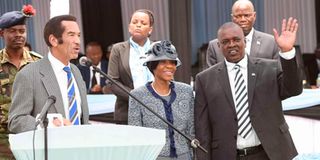Uhuru legacy intertwined with Raila electoral fate

Botswana's President Seretse Ian Khama (left) speaks next to his vice-president and upcoming Mokgweetsi Masisi and his wife Neo Masisi during a rally in his village Serowe on March 27, 2018, before officially stepping down on March 31 and handing power to his vice-president on April 1.
Global lessons on presidential succession seem to suggest it is wiser for an exiting president to play hidden cards as opposed to an open game.
An open game where an exiting President endorses someone publicly creates a dangerous burden of expectation that often backfires.
Precautions of this nature do not really matter to Raila because all he cares is for a win .But Uhuru must care because he stands to lose a lot in case his project falters. His personal reputation is on the line . But history shows history often repeats itself. There is nothing new really in this world. But often, history suggests many people learn nothing from history.
However, this should not mean history should be ignored. On the contrary, drawing lessons from regional countries where candidates have entered into office as political projects of the exiting president may help us in planning possible scenarios post August 2022.
But why do exiting presidents prefer openly endorsing a candidate as opposed to playing a hidden game? Often, they usually overestimate their strength in achieving their ends. They rarely think their plans will fail .Often they doubt if the project will turn against them.
Handshake
Others cite several reasons. In Kenya, for example, those in the President's corner seems to prefer Tinga on account of his purported mellowness. They cite his many 'backing down' examples like the ‘Handshake’ in 2018 and the 2008 grand Coalition Government of 2008 .They argue Uhuru can hedge against Raila's betrayal by having many MPs in Parliament .
Regional lessons of Botswana,DR Congo and Angola seem to suggest this is wishful thinking. Anyone who gets in power as mellow can always do a miraculous turnaround. MPs can always switch allegiance in favour of the person in power.
In Botswana, incumbent President Mokgweetsi Masisi is now in a struggle with his predecessor Lieutenant General Seretse Khama Ian Khama. The original plan was for Masisi,then a vice-president, to serve as a stopgap for Ian Khama’s brother, Tshekedi. Khama viewed Masisi as a docile and friendly person who would assume office and do his bidding. However, the plan backfired when Masisi replaced the intelligence agency Chief Isaac Kgosi, a friend of Khama. Masisi thereafter changed some of Khama's signature policies including a ban on hunting elephants. Ex- President Khama had underestimated Masisi. On taking power, Masisi started creating his own power base by attending party meetings across the entire country. Khama brothers joined the opposition ahead of the 2019 election. However, they lost to Masisi’s relentless campaign.Khama is now living in self-imposed exile in South Africa.
Grip on power
In Congo, President Felix Tshisekedi seems to have finally outmanoeuvred his predecessor Joseph Kabila’s grip on power. Few imagined Tshisekedi would move out of Kabila’s shadow when he became president in early 2019 .Some observers held the view that the 2018 presidential election may have been won by Kabila’s arch-rival Martin Fayulu but Kabila went out of his way to help Tshisekedi get power, thinking he is a mellow character.
For the longest period, Kabila had controlled the country's major institutions. His party, the Common Front for Congo (FCC) had two-thirds of seats in parliament. New President Tshisekedi had to form a coalition government with Kabila and his own party in the minority. However, on acquiring the presidency, Tshisekedi caused pro-Kabila head of the Senate to resign after MPs prepared a censure motion against him. A majority of FCC MPs had switched their allegiances. The President's new political group now had a large majority.
In Angola, the Dos Santos family left the Angolan presidency to Joao Lourenco. In a subtle effort to disentangle himself from the burden of expectation, the new president commenced a fight against corruption. The ex-president's son Jose Filomeno dos Santos was immediately arrested. During his first year in office, the president replaced the ex-president's loyalists, including provincial governors deemed close confidants of his predecessor. The former president's daughter, Isabel dos Santos, was dismissed as head of the state oil company, Sonangol.
If President Kenyatta was so minded to steer his succession, the best strategy would have been to endorse Raila in a covert manner. This would have given him an escape window just in case Ruto wins or Raila wins but decides to humiliate him. His legacy and reputation are now very intertwined with Raila’s electoral fate.
Dr Irungu Kang’ata teaches law at Catholic University of Eastern Africa. He is the Murangá Senator and an aspirant for the Murang’a Governor seat on an UDA party ticket.





